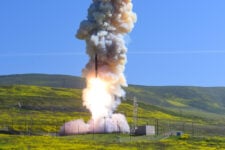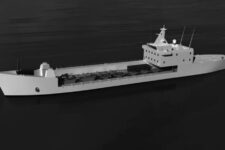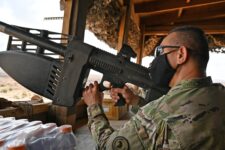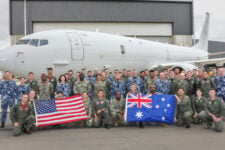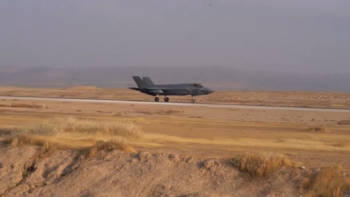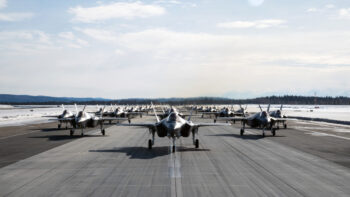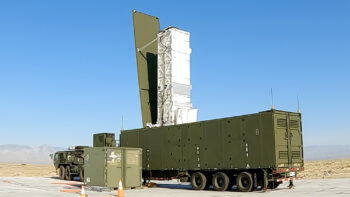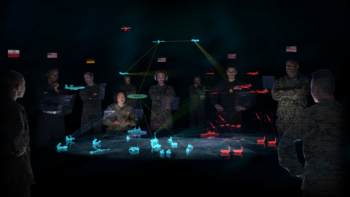 [updated Tuesday, March 6 with Gen. Mattis’s remarks to the House Armed Services Committee] CAPITOL HILL: The US should keep 13,600 troops in Afghanistan to advise and assist the Afghan forces after American combat brigades withdraw in 2014, about a quarter of the current troop level, said Central Command chief Gen. James Mattis, giving his personal recommendation — not the Administration’s final decision — after prodding from the Senate Armed Services Committee Tuesday. Rumored figures have been significantly lower. “We have to send a message of commitment,” declared Mattis, who will soon retire. But with the Navy halving its aircraft carrier presence in the Gulf and all the services cutting corners in expectation of a continued budget crunch, it’s getting harder to project resolve.
[updated Tuesday, March 6 with Gen. Mattis’s remarks to the House Armed Services Committee] CAPITOL HILL: The US should keep 13,600 troops in Afghanistan to advise and assist the Afghan forces after American combat brigades withdraw in 2014, about a quarter of the current troop level, said Central Command chief Gen. James Mattis, giving his personal recommendation — not the Administration’s final decision — after prodding from the Senate Armed Services Committee Tuesday. Rumored figures have been significantly lower. “We have to send a message of commitment,” declared Mattis, who will soon retire. But with the Navy halving its aircraft carrier presence in the Gulf and all the services cutting corners in expectation of a continued budget crunch, it’s getting harder to project resolve.
“A perceived lack of an enduring US commitment” is the biggest danger to American interests in the Central Command region, which sprawls from Egypt to Pakistan, Mattis told the House Armed Services Committee on Wednesday. While the drawdown in Afghanistan unnerves some allies, he said, “our budget ambiguity right now is probably the single greatest factor. I’m asked about it everywhere I go in the region.”
“Already, sequestration is having an operational impact in the CENTCOM area” with the indefinite postponement of the aircraft carrier USS Truman’s deployment to keep an eye on Iran, lamented SASC’s chairman, Carl Levin. Facing a funding shortfall from both the automatic cuts known as sequestration and the Continuing Resolution now funding the federal government I the absence of proper 2013 appropriations, Navy will keep Truman stateside, albeit ready for rapid deployment in a crisis.
So Mattis and Special Operations Command chief Adm. William McRaven walked a fine line in their testimony today, trying to decry the impact of budgetary gridlock on military readiness without sending a message of American vulnerability to its watchful adversaries. (Click here for more on Mattis’ and McRaven’s push for wider legal authorities to train foreign forces, even those accused of human rights violations). The problem is that on a realpolitik planet, where mere possession of military assets matters less than the political will to use them, indecision in Washington does have impacts around the world.
“I don’t want the enemy to feel brave right now. I can still deal with them in my region,” Mattis said. “Obviously, it’s more difficult for me to reassure our friends and deter Iran,” he acknowledged, “[but] I can buy the time for the second carrier to get out there with the forces I have in the Gulf.”
“I would just caution any enemy,” he said, “I have what it takes to make it the enemy’s longest day and their worst day.” Iran, he noted, has already “quieted down” about its threats to mine the Strait of Hormuz after a massive 35-nation mine-clearing exercise (called IMCMEX 2012) last fall.
That hardly means Mattis is letting legislators off the hook on funding. “Right now I have no budget certainty,” he said, which he considers a top priority. “If we got some degree of budget certainty through an appropriations bill” — even one that stuck with current, constrained funding levels but simply gave the military legal authorities and spending flexibility the current law lacks — “then like any household or business in America, we can make some wise choices,” Mattis said. “The flexibility you’re talking about for the service chiefs would be critical.”
The real damage from the current funding crunch, added Adm. McRaven, will not be obvious at once. “The sequestration and, on top of that, the Continuing Resolution will have a dramatic impact on special operations now and in the future,” he said, “[but] it will not be apparent … for several years.”
While McRaven can keep his forward-deployed funded, he has had to economize on recruiting, training of the next units to deploy — including a 60 percent reduction in flight hours for Special Operations pilots — and upgrades to equipment. At least some types of deployments are being cut back 20 to 60 percent, he added, presumably referring to long-term partnership-building efforts outside the war zone. “We are mortgaging a little bit of our readiness in the future,” McRaven said.
That’s particularly unnerving as the Syrian civil war continues to escalate, with the Assad regime resorting to long-range missile attacks on rebel territory. So far Assad has not unleashed his chemical weapons; asked if the US could stop such an attack, Mattis said, “that would be a policy decision by the President; I have military options if he wants to prevent” — and here Mattis caught himself — “if he wants to disrupt that; it would be very difficult to prevent that” entirely
Asked if the US had contingency plans to intervene in Syria should the regime collapse completely, Mattis said that “we have some quiet planning going on” with friendly nations. Russian intransigence on the Security Council means a UN-endorsed force is probably out of the question, but the Arab League or the Gulf Cooperation Council might take a leading role.
But both officers demurred on whether or not the US should provide arms to the opposition. “If we know who the weapons are going to, it’s certainly an option,” Mattis said, but he lacks “situational awareness” on whether such weapons might into the hands of al-Qaeda affiliates in the rebel movement. Most notable is the al-Nusra Front, which has at least once traded shots with other rebel fighters. “I would anticipate the worst from them but they don’t represent the opposition,” Mattis said. “That is a significant minority….They do have a powerful propaganda arm, they do use humanitarian efforts, in addition to their well-armed, well-trained fighters.”
If the Assad regime does fall, Mattis said, it would be “the biggest setback” to Assad’s ally Iran in a quarter-century. The Iranians already have Revolutionary Guard advisors on the ground in Syria and are probably arming sympathetic militias as an insurance policy against regime collapse.
It was Iran’s nuclear program, however, that most concerned both the officers and the senators at the hearing. As on sequestration, Mattis and McRaven had to walk a careful line, warning of Iranian intransigence without appearing to give up on negotiations, even while Mattis acknowledged the talks were not getting the Iranians to give up their quest for an atomic bomb.
“I fully support the economic sanctions, I fully support the diplomatic isolation, Mattis said. “I believe they are trying to buy time with the negotiations,” but nevertheless the US should continue to negotiate, he said, in response to repeated questions from Republican Sen. Kelly Ayotte about whether we were simply giving Iran time to build a bomb.
To get Iran to stop its nuclear program, declared Republican Lindsey Graham, America’s only choices are to “bring them to their senses… or bring them to their knees.” After a long, long pause, Mattis said, “yes, sir” — before hastening to add shades of grey to that black and white dichotomy.
“There may yet be a way to bring them to their senses,” Mattis said, arguing that the regime is well aware of the potentially revolutionary unrest resulting from the Iranian economy’s collapse in the face of sanctions, and “they could be willing to give up even the nuclear effort to stay in power.”
What’s more, Mattis told both committees, in a fascinating note of realpolitik, “we’re going to have recognize Iran’s legitimate security interests, so we can preclude them going for illegitimate means as a way of protecting themselves.” In other words, top mullahs in Tehran genuinely fear the US will try to overthrow them, and if they were less afraid, they might be willing to give up their quest for weapons of mass destruction.
Mattis also cautioned that our intelligence on Iran’s nuclear infrastructure is necessarily imperfect — a definite problem, though he did not say so explicitly, for any US or Israel strike. “I have to assume they have other hidden sites,” he said.
If Iran did acquire nuclear weapons, other countries in the region would as well, Mattis said: “At least one other nation has told me they’d do that, at a leadership level,” he said, confirming when asked that it was a Sunni Arab state — almost certainly Saudi Arabia, which is profoundly fearful of Iran. No one at the hearing brought up the taboo topic of whether it would be possible to live a nuclear Iran and rely on deterrence through mutually assured (partial) destruction.
On Afghanistan, by contrast, Mattis was almost cheerful. “Our mission is succeeding, the Afghan campaign is on track,” he said, and the Afghan security forces “are proving themselves capable.” They are also bearing the brunt of the war: So far this year, the US had lost four troops killed in action, the Afghans 198.
US forces in Afghanistan will drop by half this year, from their peak of 68,000 to about 34,000, but most of that drawdown will come after harsh winter weather has hampered insurgent movements and ended the “fighting season,” a timing Mattis said he feels comfortable with: “I do support the reduction by 34,000 as long as the pace left them there through this fighting season,” he said, and that’s what’s happening. The 34,000 remaining troops will stay on to help secure the Afghan elections tentatively scheduled for April or May 2014.
Beyond 2014, Mattis said he advised roughly halving the force again, to 13,600 US personnel, though he emphasized that was his recommendation to the President rather than the President’s decision. Some would be trainers and support staff on relatively safe major bases, but at least some would probably be “embedded” as advisors in Afghan combat units, he said. He also emphasized improving relationships with Pakistan, not just between US and Pakistani officers but, increasingly, in a “trilateral” relationship with the Afghans as well, who have long been bitterly suspicious of their counterparts across the border.
Afghan president Hamid Karzai has expressed increasing bitterness at the US troop presence which originally put him in power and recently ordered US special operations troops to leave the strategic province of Wardak, although Mattis emphasized that decision has not actually been carried out and “is still being worked.”
Updated 1:30 pm on Wednesday, March 6.
Lockheed wins competition to build next-gen interceptor
The Missile Defense Agency recently accelerated plans to pick a winning vendor, a decision previously planned for next year.








